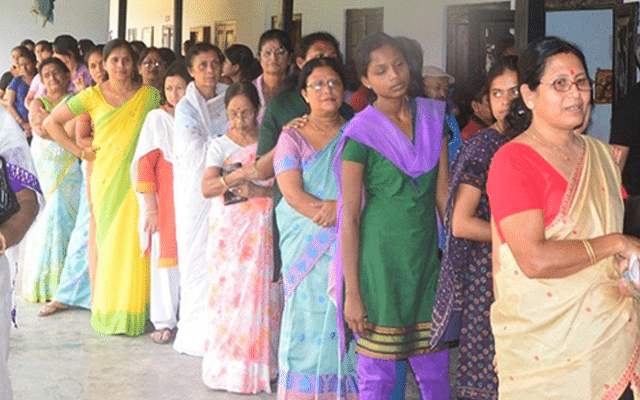Agartala: Tripura was the first state among the eight northeastern states of India to have 50 per cent reservation for women in the three-tier gram panchayats and urban local bodies in 2010 leading to women’s dominance both in the rural as well as urban areas.
According to analysts, reservation for women in local bodies has made women active participants in the political arena and in the policy making bodies.
Former Tripura Chief Minister Manik Sarkar (1998-2018) said that to empower women and allow them to play a direct role in governance the then Left Front government enacted two acts in 2010 — Tripura Panchayats (fifth amendment) Act, 2010, and the Tripura Municipal (fourth amendment) Act, 2010, ensuring 50 per cent reservation of seats in both rural and urban local bodies.
Terming the two acts as “historic”, Sarkar said : “The enhancement of reservation for women was not done as a kindness to women, it was done to establish the equal responsibility of men and women in the society.”
“The then Left Front government in Tripura sincerely wanted the empowerment of women and brought them into the decision making process and this constitutional amendment would certainly help the process,” he told IANS.
He said that Tripura was the first state in India to provide 50 per cent reservation for women among the office bearers of the local bodies both in the rural and urban areas.
“The increased participation of women in public life after the introduction of reservation has proved to have many benefits and the speed of development has accelerated manifold,” Sarkar added.
Tripura University Rural Studies department head Dr. Jayanta Choudhury said that implementing 50 per cent reservation for women in the local governments in Tripura, or any region, has both advantages and disadvantages.
According to Choudhury, reservation promotes gender equality by ensuring women have a fair representation in local government bodies, which historically had been male-dominated.
“Reservation empowers women to participate in decision-making processes, allowing them to voice their concerns and influence policies that directly affect their communities in Tripura.
“It also brings diverse perspectives to the table, potentially leading to more holistic and inclusive policies that address a wider range of gender issues like drugs, alcoholism, child/girl marriage, nutrition, etc,” Choudhury told IANS.
He said that female leaders can serve as role models, inspiring other women and girls to pursue leadership roles in politics and other fields.
“Research shows that women in leadership roles often prioritize social welfare, health, and education, which can benefit society as a whole, specifically mobility, political and cultural affairs.”
He said that some individuals feel that such reservations are discriminatory and lead to resentment among those who don’t benefit from them.
“Critics argue that reservations might prioritize gender over qualifications, potentially leading to less qualified candidates occupying positions.
“There’s a risk of tokenism, where women are included for the sake of meeting quotas but may not have real decision-making power.”
Noting that implementing such women quotas faces resistance from existing power structures, making it challenging to enforce them effectively, Choudhury said that focusing solely on gender overshadows the need for representation of other marginalized groups like ethnic minorities or the economically disadvantaged.
Academicians and researchers Aparna De and Koushik Das in their recent studies said that it has been observed that reservation of seats in three-tier panchayat institutions has made women active participants in the political arena.
So, certain measures for effective participation of women in state and national level politics may be suggested in this connection.
Their suggestions include, at least one-third of the Tripura Assembly’s 60 seats may be reserved for women and out of the two Lok Sabha seats in Tripura, one seat may be reserved for women.
Their other suggestions include conducting periodical training for newly elected women representatives, initiation of training-cum awareness building programmes for greater impact on the male mentality towards their counterparts, so that women are given enough space to play their role in political institutions.
Economic independence is a pre-condition for political empowerment of women, De and Das said in their study document.
“Elected women representatives have to depend on their husbands or other male members of the family for their living. In such a situation it is difficult for women, mostly coming from the marginalized sections of the society, to discharge their responsibilities effectively.
“Hence, means of livelihood should be ensured for them. The honorarium and sitting allowance of the elected representatives at the grassroot level should be increased,” they said.
Due to the reservations for women many years ago and their consciousness about politics and governance, the voting percentage of women is sometimes higher than their male counterparts while the participation of women in various government and non-government sectors is gradually increasing.
A record number of nine women were elected to the 60-member Tripura assembly in the February 16 polls.
With nine of the 31 women contestants winning, the Tripura assembly now has the highest number of women legislators since it became a full-fledged state in 1972.
In 2013, five of the 15 women contestants became lawmakers in Tripura, while three women were elected in the assembly polls in 2018.
Writer and social activist Nandita Datta said that with the reservation of seats for women in the rural and urban bodies, women are now either playing a leading or active role in all important aspects of society.
“There are many women, despite their lesser academic background, due to their political consciousness, they have been playing decisive and active roles in many non-political aspects too including prevention of drug menace.
“If the male leaders genuinely and sincerely change their mindset towards women’s role then only women would be more successful. Men can help the women in governance, but men should not dominate women in governance,” Datta told IANS.
She said that there are many instances in Tripura where women belonging to the tribal sector, scheduled tribes and other backward communities became successful leaders with their devotion to work, seriousness and honesty.

















